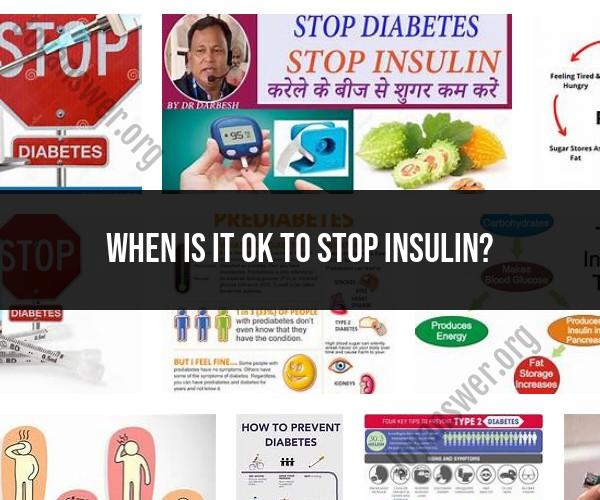When is it OK to stop insulin?
Knowing When to Stop Insulin: A Comprehensive Guide
Insulin is a hormone that plays a critical role in regulating blood sugar levels. People with diabetes, particularly those with type 1 diabetes and some with type 2 diabetes, often require insulin therapy to manage their condition. However, there are situations where stopping insulin might be considered. It's important to note that any decision to stop insulin should be made in consultation with a healthcare professional. Here's a comprehensive guide to understanding when it might be appropriate to consider stopping insulin:
1. Type 1 Diabetes:
Stopping insulin therapy is generally not recommended for individuals with type 1 diabetes. Type 1 diabetes is characterized by the immune system attacking the insulin-producing cells in the pancreas. People with type 1 diabetes depend on insulin injections or an insulin pump to survive. Discontinuing insulin in type 1 diabetes can quickly lead to dangerously high blood sugar levels (hyperglycemia) and life-threatening complications.
2. Type 2 Diabetes:
For individuals with type 2 diabetes, insulin therapy is often prescribed when other medications and lifestyle changes no longer adequately control blood sugar levels. In some cases, stopping insulin might be considered under the following circumstances:
Significant Weight Loss: If an individual with type 2 diabetes successfully achieves substantial weight loss through diet and exercise, their insulin sensitivity may improve. This could lead to reduced insulin requirements or even the possibility of discontinuing insulin.
Improved Blood Sugar Control: Some people with type 2 diabetes may experience improved blood sugar control through diligent adherence to medication, diet, and exercise regimens. In consultation with a healthcare professional, they might explore the option of tapering or discontinuing insulin.
Underlying Causes Addressed: Occasionally, type 2 diabetes might be driven by specific factors such as certain medications or hormonal imbalances. Addressing these underlying causes might lead to better blood sugar control, potentially allowing for insulin reduction.
3. Gestational Diabetes:
Gestational diabetes occurs during pregnancy and often requires insulin therapy to manage blood sugar levels. In some cases, blood sugar levels can be well-controlled through dietary changes and careful monitoring. If blood sugar levels stabilize within target ranges, a healthcare provider might consider discontinuing insulin after evaluating the risks and benefits.
4. Consult a Healthcare Professional:
Deciding when to stop insulin is a complex decision that requires careful consideration and medical expertise. Never make this decision on your own. Consult your healthcare provider before making any changes to your insulin regimen. They will assess your individual medical history, blood sugar levels, overall health, and treatment goals to determine whether discontinuing insulin is safe and appropriate.
Final Thoughts:
Stopping insulin therapy should always be approached with caution and under the guidance of a qualified healthcare professional. The goal is to maintain stable blood sugar levels while preventing complications associated with both hyperglycemia and hypoglycemia. Diabetes management is a collaborative effort between the individual and their healthcare team, and decisions about insulin therapy should be made in partnership with the guidance of medical experts.













